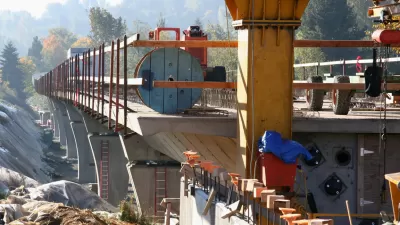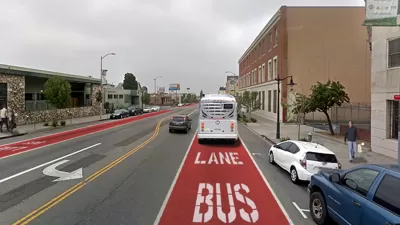Twenty years after the movie Speed, which took place on the Big Blue Bus, Metro rail system, and other transit facilities, Keanu Reeves and crew might not recognize L.A.'s current transit system. L.A. County planner Clement Lau surveys the changes.
After watching the 1994 movie Speed on television on a recent night, LA County Planner Clement Lau was inspired to jot down some of the changes to the LA transit system featured in the movie. The movie starred Keanu Reeves, Sandra Bullock, Dennis Hopper, and Jeff Daniels, and took place on LA's Big Blue Bus, Metro Red Line, Interstate 105, and LAX airport, all of which have morphed dramatically:
"The bus in the film is a General Motors “New Look” bus, which was first introduced in 1959 but kept in prominent and active service by Santa Monica until early 2005, long after most other American cities had retired the retro-looking bus. (The “New Look” bus was commonly known by the nickname “Fishbowl” (for its six-piece rounded windshield) and was produced by General Motors until 1987.) Big Blue Bus todayToday, the Big Blue Bus fleet is modern and environmentally-friendly, powered by compressed gas (CNG), liquefied natural gas (LNG) and electric/gas hybrid engines."
"In the movie, Annie (Sandra Bullock) navigated the bus . . . onto the empty Interstate 105 freeway, which was under construction at that time. . . there is a gap in the freeway at an upcoming interchange. . . [she] accelerates the bus to . . . jump over the gap . . ." After many hurdles, the gaps have been bridged and the 105 is now complete.
"In Speed, Jack [Keanu Reeves] sees the exit on the 105 for LAX and tells Annie to get off the freeway and drive into the airport where the bus can circle its runways and news helicopters cannot film the bus. . . Today, LAX is in the midst of a $4.11 billion renovation and improvement program to expand and rehabilitate the Tom Bradley International Terminal . . ."
"In the movie, Jack chases the bomber (Dennis Hopper) on the Metro (Red Line) and ultimately defeats him. . . L.A.’s Metro rail system has expanded greatly since 1994. In addition to the Red Line, the following lines have opened: Green (1995), Gold (2003), Purple (2006), and Expo (2012). (The Blue Line started operating in 1990.) . . . Metro is now working on the Regional Connector project which would extend from the Metro Gold Line Little Tokyo/Arts District Station to the 7th Street/Metro Center station in Downtown L.A. . . "
The article goes on to elaborate on the additions to and ambitions for LA's transit system.
FULL STORY: Los Angeles: 20 Years after Speed

Planetizen Federal Action Tracker
A weekly monitor of how Trump’s orders and actions are impacting planners and planning in America.

Map: Where Senate Republicans Want to Sell Your Public Lands
For public land advocates, the Senate Republicans’ proposal to sell millions of acres of public land in the West is “the biggest fight of their careers.”

Restaurant Patios Were a Pandemic Win — Why Were They so Hard to Keep?
Social distancing requirements and changes in travel patterns prompted cities to pilot new uses for street and sidewalk space. Then it got complicated.

Platform Pilsner: Vancouver Transit Agency Releases... a Beer?
TransLink will receive a portion of every sale of the four-pack.

Toronto Weighs Cheaper Transit, Parking Hikes for Major Events
Special event rates would take effect during large festivals, sports games and concerts to ‘discourage driving, manage congestion and free up space for transit.”

Berlin to Consider Car-Free Zone Larger Than Manhattan
The area bound by the 22-mile Ringbahn would still allow 12 uses of a private automobile per year per person, and several other exemptions.
Urban Design for Planners 1: Software Tools
This six-course series explores essential urban design concepts using open source software and equips planners with the tools they need to participate fully in the urban design process.
Planning for Universal Design
Learn the tools for implementing Universal Design in planning regulations.
Heyer Gruel & Associates PA
JM Goldson LLC
Custer County Colorado
City of Camden Redevelopment Agency
City of Astoria
Transportation Research & Education Center (TREC) at Portland State University
Camden Redevelopment Agency
City of Claremont
Municipality of Princeton (NJ)





























